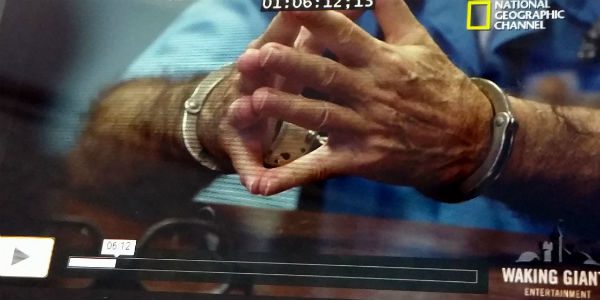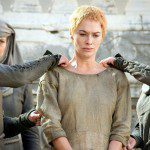 Among those who don’t believe in God, one compelling argument for their position is, “If there was a God that was omniscient and omnipotent, and inherently good, then why does evil exist?”
Among those who don’t believe in God, one compelling argument for their position is, “If there was a God that was omniscient and omnipotent, and inherently good, then why does evil exist?”
It’s a simple question, but just because a question can be posed simply doesn’t mean it has a simple answer.
That’s something Morgan Freeman discovers in “Why Does Evil Exist?”, the Sunday, May 1, episode of National Geographic Channel’s documentary series “The Story of God,” airing at 9 p.m. ET/PT.
From Ancient Egypt to Hinduism to Christianity to a scientific discussion of the mind of a serial rapist/murderer, Freeman looks at why people do evil, and how people deal with evil done to them or those they love.
One thing you learn as a Catholic is that the world is not very often an either/or proposition; it’s more of a both/and. We are both good and evil; we do both good and evil. The Catholic viewpoint is not a Manichean idea of a war between good and evil. The universe God created is good, but evil happens within it. And that is because we are free.
But God is not bound by this duality that we see in humanity. God is not a thing with more than one nature, or a personality that can have two sides. God is existence itself, and since existence makes possible everything that there is, it’s good. God is good, and all that He makes is good. But things don’t always remain as they were at the time they were created. To sentient creatures — first, the angels, and then, humanity — God gave free will.
We are not like the inanimate things of the world, which are bound purely by the laws of physics. Nor are we merely animals, which, by virtue of their genetic makeup, have a very specific place in the hierarchy of nature, and live out this biological destiny without confusion. They know what they are, and they know what they must do. These are two things that most humans wrestle with all their lives. We are both flesh and spirit; body and mind; both in the world, and not of it.
And it’s our free will that makes us so.
First, the angels, beings of pure spirit, had it, and some of them — including Lucifer or Satan — used it to rebel against God, who allowed it … since, if He didn’t, the free will would have been an illusion.
Then, humans had it. The rebellious Satan, in the form of a serpent, tempted Eve — who was created good — with the notion of eating of the Tree of the Knowledge of Good and Evil, and thereby becoming like God. Having her human curiosity (a good quality which can also cause great problems), she ate, and then Adam made the choice to follow her lead. Therefore, rather than being pure, innocent creatures who walked with God in cool of the evening, they became the complex, conflicted, intelligent, altruistic, kind, cruel creatures we are today.
Here’s how a Baptist preacher described this to Freeman:
In the Catholic view, because of Original Sin, we are fallen creatures, with both the capacity for great good and for great evil.
This freedom to choose to do what we ought, or to choose to do what we will, is what makes us uniquely human.
We always, though, have that choice — unless we are not in our right minds because of some sort of serious physical or mental illness, or we are possessed by a demon (another form of fallen angel).
Catholicism allows for both science and the supernatural. In modern days, with our greater knowledge of psychology and other sciences, we look first for a temporal answer to evil deeds. Freeman talks to a serial rapist and murderer of women, who demonstrates brain abnormalities particular to psychopaths. But he’s not insane. He knows what he did was wrong, and while he claims he’s powerless against his impulses, he recognizes that society would not be safe were he let loose. He’s a rational person, but he lacks empathy, and so his selfish desires become more important than anything or anyone else. He has both a brain abnormality and is responsible for his crimes.
The Church also allows for the possibility of demonic possession. In the unusual occurrence where possession is believed to be happening, we have exorcism as a remedy.
But barring these things, our free will is our own. And sometimes we use it to commit terrible acts. Even then, Catholics understand that knowledge and circumstances can mitigate a person’s responsibility for what they do. Also, while there is life, there is always the possibility of repentance and redemption, no matter what a person has done. However, this doesn’t lessen the pain and grief from the acts committed, which is a great challenge to faith, even among the most devout.
We also sometimes interpret natural disasters or illness as evil, or as punishments. That’s not the Catholic view. Nature obeys physical laws that don’t have a moral component, and that includes diseases. We can make poor choices that impact how much we suffer from natural occurrences or illness, but in and of themselves, these are morally neutral. The good or evil comes in how we respond to them. And God allows them because that’s how the world works, and it works the same for every living creature, regardless of its relative intrinsic goodness. No one — not even Christ — is immune from suffering, and fairness seldom enters into it.
Now and then, God permits miracles to strengthen our faith, but that’s the exception, not the rule.
When the Biblical Job, beset by evil of every nature, questioned God, he essentially was told that there was no way he could comprehend God’s view of time and space, of how each thing fit into the whole. We have all experienced apparent blessings that turned sour; or apparent curses that were blessings in disguise; and also terrible suffering for which there never appears to be any larger purpose or justification.
Humans can be both victims of supernatural evil, and agents of evil against each other. God allows it, because He allows us to be free. We must freely choose to turn away from evil and to love Him.
All this sounds simple in theory, but it’s brutally hard in reality. But, like a refreshing rain after a scorching day, the darkness of the world makes the light shine brighter. Knowing the hideous things people can do, we appreciate kindness all the more.
And we are asked to be kind, even in the face of the worst others choose to do — because giving good for good is easy, but good for evil is the real challenge.
From Matthew, Chapter 5:
43 “You have heard that it was said, ‘You shall love your neighbor and hate your enemy.’
44 But I say to you, love your enemies, and pray for those who persecute you,
45 that you may be children of your heavenly Father, for he makes his sun rise on the bad and the good, and causes rain to fall on the just and the unjust.
46 For if you love those who love you, what recompense will you have? Do not the tax collectors* do the same?
47 And if you greet your brothers only, what is unusual about that? Do not the pagans do the same?“]
48 So, be perfect, just as your Heavenly Father is perfect.
Images: “Story of God” screenshot
Don’t miss a thing: head over to my other homes at CatholicVote and the Faith & Family Media blog, and like my Facebook page; also like the Patheos Catholic FB page to see what my colleagues have to say.













